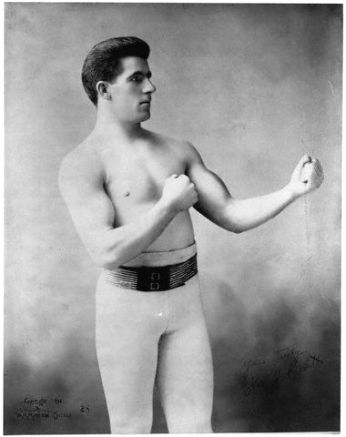James J. Corbett was an American boxer dubbed “Gentleman Jim” because of his good looks, and quiet, self-effacing personality – a stark contrast to the typical mug-like fighters of his day.

Among the qualities of a true gentleman are courtesy, respect, good work habits, self-restraint, as well as a sense of caring about how their actions affect others. Every day, I strive to live up to those qualities. While I don’t always succeed, I am inspired by the stories of others. Former Baseball Commissioner Fay Vincent wrote such a motivating story that appeared in The Wall Street Journal (June 13), about the qualities of his father who codified them into a set of “commandments” that he passed on to his son.
• “Always be a gentleman. To my father, a gentleman is someone who never offends another person needlessly. He lived that code. He stood when a woman entered the room. He tipped his hat when he wished to pay respect. He even kept his mouth shut even when his calls were challenged while he officiated football and baseball games. His sturdiest reply to insults was ‘Go peddle your papers,’ [meaning, get out of my face.]
• “Always keep your shoes shined. QED.
• “Save your money. It will be your best friend. Here my father reflected the Great Depression and his experience of graduating from Yale with every athletic honor—only to discover the sole job available was digging post holes for the local electric utility.
• “Any week in which you do not put some money aside for a rainy day is a wasted week. This was a corollary to his injunction to save—which he did with religious zeal. He also invested in stocks with some success. But he insisted on receiving dividends and would shun any stock that did not pay him dividends.
• “A car is the most expensive thing you can own. He told me to try and avoid buying one, reminding me that it falls in value by a huge percent the minute you drive it off the lot. My father followed his own counsel, and the family did not own a car until I was about 12. He rode the bus and walked just about everywhere. We always lived near a bus line.
• “A pension is important. If possible, find a good job with a bank, insurance company or utility where layoffs are rare. A good job is one that is secure and not always the one with the highest pay.
• “If your boss or employer is not making money on you, you will eventually lose your job. Your work has to permit him to profit on what you produce. If you and the employer just break even you are not being properly productive. Get to work early and stay late if necessary.
• “It is more important to be able to write and speak well than it is to be able to succeed in athletics. My father was a superb football and baseball player at Yale, but he was certain the language skills he did not possess were the most important ones in any business or professional career.
• “There is no such thing as an honest politician. He viewed politicians with the same cynical eye he cast on doctors, lawyers and priests. He accepted the argument there must be some good and decent ones but he was suspicious until solid facts prevailed.
My father valued hard work over brilliance and saw most professions as predatory. As my physician sister left the house every morning his regular admonition was, ‘Don’t charge some poor people today.’
• “The finest legacies are often not material things. The lessons my father instilled in me are precious because they are so firmly grounded in experience. For that reason and for so many more, he remains with me daily.”
While I don’t subscribe to all of the elder Vincent’s “commandments,” taken as a whole, a gentleman lives up to a moral contract that obligates him to act in ways that are consistent with what he believes and what he practices.
Comments










